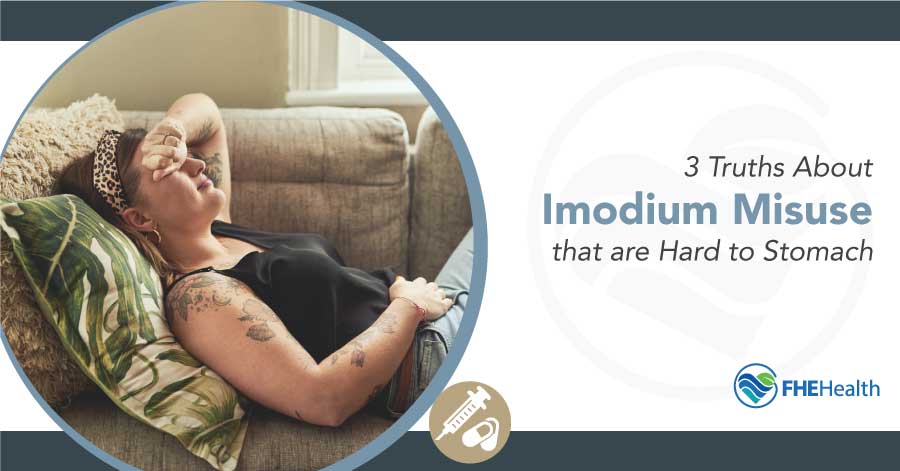
Imodium is a drug that’s not well understood, despite being commonly used to ease the symptoms of irritable bowel syndrome (IBS), Crohn’s disease, and a whole host of other conditions that affect the digestive tract and cause diarrhea. People have come up with ways to use Imodium other than as directed by the drug manufacturer and the FDA, and this is where problems can arise.
In this piece, we’ll discuss the issues concerning Imodium — what it is, how it’s being used (or abused), and some of the ideas that are driving Imodium misuse. What we found is that, more often than not, people are misusing Imodium based on beliefs that aren’t true and putting themselves in danger as a result.
Treatment can begin quickly and discreetly, get started now Imodium and similar medications contain modified opioid molecules called loperamide, which are similar to the molecules in other opioids like methadone, prescription pain relievers, and fentanyl that bind to opioid receptors throughout the body. The difference with Imodium, though, is significant. While other opioid molecules access receptors in the brain and signal the release of chemicals that cause feelings of euphoria and pleasure, loperamide (the chemical name for Imodium) can’t make it to the brain when used as directed (by design). Instead, it binds to receptors in the gastrointestinal tract. Imodium is an effective defense against cases of diarrhea, both chronically, as a result of a range of diseases that affect the colon and other parts of the GI tract, and in acute instances. Imodium is used every day by millions of people for the benefits that it advertises. It’s also abused by a growing population of users trying to gain additional benefits that aren’t advertised. There are three main reasons why Imodium misuse occurs: Most of the abuse of Imodium that is prompted by information online is based on a misunderstanding of the drug. Here are three of the key myths about Imodium and the truth that paints a different story from what some people have been led to believe. Based on what we know about modified opioid molecules in the form of loperamide, can you get high from Imodium? The answer is concerning: The only way to get a true opiate high from Imodium is to take it in unsafe amounts. When used as directed, loperamide doesn’t cross the brain-blood barrier that separates the brain and spinal column from the rest of the body. This means that while the molecules in other opioids can more naturally bind to receptors in the brain, causing the release of dopamine, Imodium doesn’t. As a result, people take higher and higher doses, to the point that Imodium, a drug that isn’t known to be dangerous, becomes so. One review of 21 deaths involving excessive amounts of loperamide found that in 19 of the cases in question, an overdose of Imodium was the primary cause of death. Many people see that Imodium is a mild opioid and put in on par with Suboxone®, which is commonly used to help those struggling with heroin addiction ease their withdrawal symptoms and reduce cravings. This is likely why online detox guides list Imodium as a potential aid. While Imodium will help reduce diarrhea during withdrawal, decreasing the risk of dehydration by a slight margin, there’s no scientific research to support that it will do anything beyond that. When we get into the science, the similarities between buprenorphine — one of the key active ingredients in Suboxone® — and Imodium are few. While Imodium is a full opioid agonist, meaning that it fully binds to opioid receptors, it doesn’t target the areas that would make a major difference in the way the body reacts to withdrawal. On the other hand, buprenorphine is a partial opioid agonist, meaning that it targets opioid receptors in the brain in a limited capacity. This gives the user a small amount of the effects of addictive opiates, lessening the symptoms of withdrawal while decreasing the risk of addiction. If you’re using Imodium as a way to support your detox, it’s likely that you’re trying to detox on your own, which can be extremely dangerous at worst and unlikely to be successful at best. Most people find the cravings and discomfort of dope sickness to be more than they can handle; they often relapse within the first few days. In addition, a risk of dehydration and heart failure exists during opiate withdrawal, and without access to a safe, clinical environment, detox presents a serious risk. Detox from any substance is difficult when attempted alone, but with heroin and other opiates, it’s even more so. This is why it’s so important to find a trustworthy resource to help you undergo detox from opiates, such as Imodium misuse, in an environment that’s safe. At FHE Health, we offer full medical detox, with 24/7 clinical supervision. There’s a lot of misinformation about the potential of Imodium for detox, especially in online recovery guides. If you’re seeking methods for detox, please seek medical detox instead, as it is much safer and more comfortable. If you or a loved one is struggling with addiction to heroin or other opiates, contact FHE Health today and learn about your options. Kristina Robb-Dover is a content manager and writer with extensive editing and writing experience... read moreNeed Help?
First, What Is Imodium?
Why Is Imodium Misused?
The Hard Truths About Imodium
1. Imodium Won’t Get You High (At Least Not Safely)
2. Imodium Doesn’t Help With Detox in the Way You Think
3. Using Imodium as a Way to Self-Detox Is Dangerous
Medical Detox With FHE Health
![]()
About Kristina Robb-Dover






